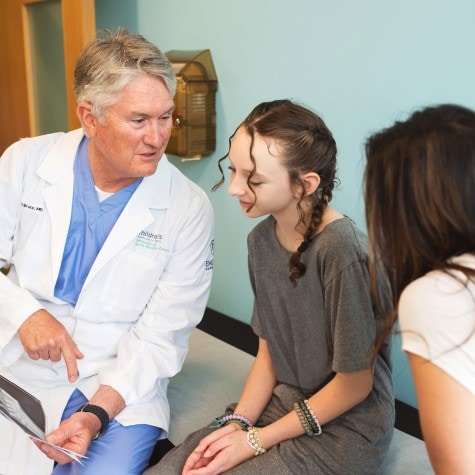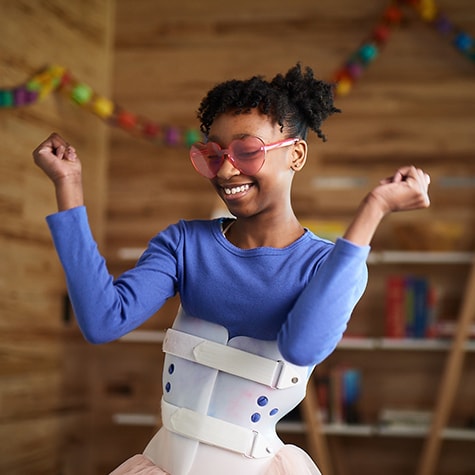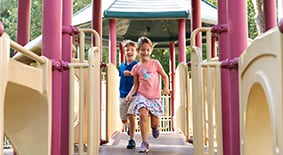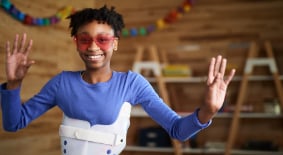Why Is My Kid Complaining About Back Pain?
Occasional back pain can be common in children, especially if they are age 10 and younger. But persistent back pain is not common in children. If your child starts complaining of persistent back pain, they should be examined by a pediatric spine specialist immediately, as there are a number of treatment options available.
Back pain in children is incredibly common and often related to things like constipation. But if your child’s back pain persists, there may be a specific injury or condition that needs to be examined by a pediatric spine specialist.
“Quick spurts of back pain aren’t uncommon for children, but your kid’s back may need more immediate attention if he is complaining of constant back pain in one specific area, needs medicine to help with the pain or limits his activity or if it’s associated with fevers, chills and weight loss,” said Nicholas D. Fletcher, MD, a Pediatric Orthopedic Surgeon and Medical Director of Spine Quality and Outcomes at Children’s Healthcare of Atlanta.

- Overuse and muscle strains, which can be caused by physical activity
- Stress fractures, also known as spondylolysis
- Scoliosis, a curvature of the spine greater than 10 degrees
- Scheuermann’s kyphosis
- Herniated disc
- Backpacks
“If your child is experiencing any of these issues, we recommend having them checked out by a pediatric-trained spine specialist,” Dr. Fletcher added. “Our team at Children’s is dedicated to providing quality spine care to children, and we have the knowledge, experience, training, support staff and consulting physicians on hand to effectively treat kids in a way that will help keep their growing spines safe and healthy for years to come.”

Where you take them matters.
Request an appointment with the only nationally ranked orthopedic program for kids and teens in Georgia, and we’ll help you understand your child’s diagnosis and create a comprehensive treatment plan.
Make an AppointmentThere are multiple factors a pediatrician should consider when determining if your child needs to be referred to a pediatric spine specialist. These may include:
- Back pain resulting in stiffness of the spine and associated with a fever, general discomfort, uneasiness or pain, or a poor appetite
- Chronic pain that lasts longer than six weeks
- Back pain associated with leg pain
- Back pain that interferes with your child’s sleep
- Back pain that prevents your child from participating in activities
Examining back pain in kids
Your child’s doctor will first complete a physical examination of your child, which may include physical movements like bending to touch toes or twisting, and will ask several questions to determine the cause and location of the pain. Your child’s doctor may also recommend additional tests, such as:
Once our pediatric spine specialists determine the specific injury or cause of your child’s back pain, we may suggest treatment. Below are examples of treatment based on common sources of back pain in children:
- Overuse and muscle strains are by far the most common causes of back pain in children and teens but usually resolve after a period of rest or activity modification. Anti-inflammatory medicines, such as ibuprofen or naproxen, as well as ice or warm compresses may also help relieve symptoms. Low-impact walking each day may help improve the condition as the initial injury heals, and hamstring stretches and abdominal strengthening can help relieve persistent back pain. Many kids may also benefit from a physical therapy program to teach them appropriate exercises.
- Stress fractures, also known as spondylolysis, are a defect in the vertebrae of the spine that can cause lower back pain as a result of activities that require twisting or hypertension, or repeated arching, of the back, such as gymnastics, wrestling or hockey. Taking a break from sports and doing exercises focused on hamstring stretching and core strength can help relieve tension in the lower back and improve symptoms. A back brace can provide some relief in certain cases. Surgery is reserved for those cases of severe pain that do not improve with prolonged non-operative treatment.
- Scoliosis is a sideways curve of the spine that is usually diagnosed during the routine health exam portion of a school’s scoliosis screening program. About 2-3% of children have scoliosis. Early detection and treatment, such as bracing, physical therapy or possibly even surgery, can help save your child from a lifetime of pain and other issues like heart or lung problems.
- Scheuermann’s disease, or a round back, is often characterized by wedge-shaped vertebrae that collapse and result in a hunched or rounded appearance, making a child look as though he doesn’t have good posture. Core exercises can help improve the condition, but a back brace or surgery may be recommended in more severe cases.
- A herniated disc develops when one of the discs between the vertebrae of the spine moves out of position and presses on adjacent nerves. These discs are cushions that have a soft center and a hard outside. If the hard part of the disc cracks and the soft part is exposed, it is called a herniation. Physical therapy is usually the first step in treatment, but our specialists might recommend surgery known as discectomy to remove the disc.
- Backpacks loaded down with textbooks, gym equipment and school supplies, or not worn correctly, can cause back pain in children and teens. A child should wear a backpack made of light material, like canvas or nylon, that is the right size for them. In addition, backpacks shouldn’t weigh more than 15-20% of your child’s body weight, which means a child who weighs 100 pounds shouldn’t have a backpack that weighs more than 15 to 20 pounds.

Georgia's only nationally ranked Orthopedic Program for kids and teens
We are among the best orthopedic programs in the nation for kids and teens based on factors like overall outcomes, number of patients treated, fewer complications, best practices and more.
Learn MoreNicholas D. Fletcher, MD, is a Pediatric Orthopedic Surgeon and serves as Medical Director of Spine Quality and Outcomes at Children’s Healthcare of Atlanta. He is also an Associate Professor of orthopedic surgery at Emory University School of Medicine. Dr. Fletcher’s areas of clinical expertise include spine and hip conditions. For children with scoliosis, kyphosis and spondylolisthesis, he offers a range of nonsurgical and surgical options, including Mehta casting, bracing and posterior spinal fusion, as well as magnetic expandable growing rods (MAGEC) and VEPTR.
This content is general information and is not specific medical advice. Always consult with a doctor or healthcare provider if you have any questions or concerns about the health of a child. In case of an urgent concern or emergency, call 911 or go to the nearest emergency department right away. Some physicians and affiliated healthcare professionals on the Children’s Healthcare of Atlanta team are independent providers and are not our employees.
Contact Us 404-255-1933







